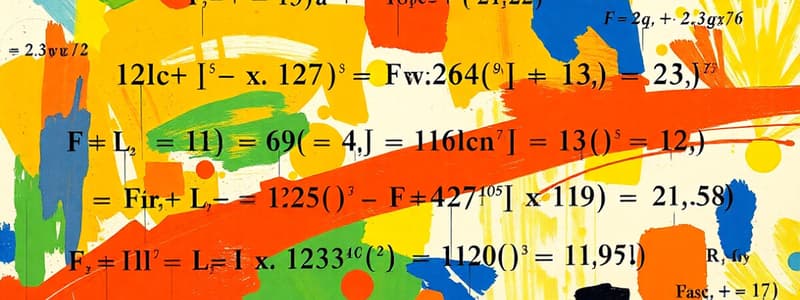Podcast
Questions and Answers
What is the magnitude of the resultant vector for A = 6^i + 4^j and B = 2^i - 7^j?
What is the magnitude of the resultant vector for A = 6^i + 4^j and B = 2^i - 7^j?
- 85
- 58 (correct)
- 50
- 10
What is the y-component of the resultant vector R for A = 3^i - 6^j and B = 8^i + 2^j?
What is the y-component of the resultant vector R for A = 3^i - 6^j and B = 8^i + 2^j?
- -4 (correct)
- 2
- -3
- -8
What is the magnitude of the resultant displacement if a hiker walks 30 km due east and then 50 km at a 45° angle north of east?
What is the magnitude of the resultant displacement if a hiker walks 30 km due east and then 50 km at a 45° angle north of east?
- 70.50 km
- 66.17 km (correct)
- 60.32 km
- 72.45 km
Find the angle between the vectors A = 2^i + 5^j and B = 4^i + 2^j.
Find the angle between the vectors A = 2^i + 5^j and B = 4^i + 2^j.
Determine the angle between the vectors A = 5^i - 2^j and B = -3^i + 6^j.
Determine the angle between the vectors A = 5^i - 2^j and B = -3^i + 6^j.
What is the unit of pressure P when a force F is applied to a surface area A?
What is the unit of pressure P when a force F is applied to a surface area A?
What is the unit of gravitational potential energy U for an object of mass m at height h?
What is the unit of gravitational potential energy U for an object of mass m at height h?
What is the unit of density ρ of a fluid in the drag force equation Fd = 1/2 Cd ρAv?
What is the unit of density ρ of a fluid in the drag force equation Fd = 1/2 Cd ρAv?
What is the unit of kinetic energy K when expressed in terms of mass m and velocity v?
What is the unit of kinetic energy K when expressed in terms of mass m and velocity v?
What is the unit of frequency f related to the wave speed v and wavelength λ?
What is the unit of frequency f related to the wave speed v and wavelength λ?
Flashcards
Unit of Pressure
Unit of Pressure
The unit of pressure is kg⋅m⁻¹⋅s⁻²
Unit of Gravitational Potential Energy
Unit of Gravitational Potential Energy
The unit of gravitational potential energy is kg⋅m²⋅s⁻²
Unit of Fluid Density
Unit of Fluid Density
The unit of fluid density is kg⋅m⁻³
Unit of Kinetic Energy
Unit of Kinetic Energy
Signup and view all the flashcards
Unit of Frequency
Unit of Frequency
Signup and view all the flashcards
Resultant vector magnitude (Q11)
Resultant vector magnitude (Q11)
Signup and view all the flashcards
Y-component resultant vector (Q10)
Y-component resultant vector (Q10)
Signup and view all the flashcards
Angle between two vectors (Q16)
Angle between two vectors (Q16)
Signup and view all the flashcards
Vector Resultant (General)
Vector Resultant (General)
Signup and view all the flashcards
Components of a vector (implied in questions)
Components of a vector (implied in questions)
Signup and view all the flashcards
Study Notes
Units of Physical Quantities
- Pressure (P): kg m⁻¹s⁻²
- Gravitational Potential Energy (U): kg m²s⁻²
- Density (p): kg m⁻³
- Kinetic Energy (K): kg m²s⁻²
- Frequency (f): Hz (or s⁻¹)
Physics Formulas and Quantities
- Pressure: Pressure = Force / Area (P = F/A)
- Gravitational Potential Energy: U = mgh (m = mass, g = acceleration due to gravity, h = height)
- Drag Force: Fd = ½ * Cf * p * A * v² (Cf = drag coefficient, p = density, A = area, v = velocity)
- Kinetic Energy: K = ½ * mv² (m = mass, v = velocity)
- Frequency of a wave: f = v / λ (v = wave speed, λ = wavelength)
Studying That Suits You
Use AI to generate personalized quizzes and flashcards to suit your learning preferences.




